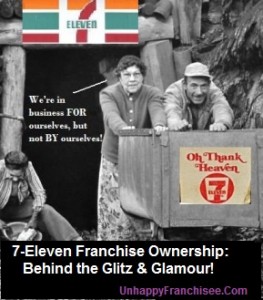05 Aug NJ Lawsuit Claims 7-Eleven Franchise Program is an Employment Scam
July 30, 2013 by Sean Kelly
 Individuals invest hundreds of thousands of dollars with the dream of owning their own businesses and being their own bosses as 7-Eleven franchisees.
Individuals invest hundreds of thousands of dollars with the dream of owning their own businesses and being their own bosses as 7-Eleven franchisees.
A NJ lawsuit contends that all they’re really buying are low-paying jobs with no equity, no benefits, no overtime and a dishonest, abusive boss.
(UnhappyFranchisee.Com) A lawsuit filed in NJ District Court by Red Bank, NJ-based Marks & Klein on behalf of 7-Eleven franchisees alleges that “7-Eleven intentionally misclassifies its store operators as franchisees in order to increase corporate profits and avoid paying overtime, medical and pension benefits, FICA and other state and federal employer taxes.”
The lawsuit, filed in NJ District Court on July 30, 2013 by Marks & Klein attorneys Jerry Marks, Louis Tambaro, and Evan Goldman, alleges that 7-Eleven, Inc. is running a fraudulent scam that abuses its store operators and violates the New Jersey Fair Labor Standards Act, the New Jersey Franchise Practices Act, and the New Jersey Law Against Discrimination.
The plaintiffs in the case are New Jersey 7-Eleven franchise owners Tamer G. Atalla, Neil Naik, Hemang Patel, Jayesh Patel, Kalpana B. Patel, and (as yet unnamed franchisees) John Does 1-200.
The defendants in the case are Dallas-based 7-Eleven, Inc., a wholly-owned subsidiary of Seven-Eleven Japan Co., Ltd.; Tokyo-based Seven-Eleven Japan, a wholly-owned subsidiary of Seven and i Holdings Co. Ltd.; and Seven and i Holdings Co., Ltd, a Japanese corporation.
In a nutshell, the lawsuit (which is posted as a download below) alleges that 7-Eleven, Inc. controls its franchisees to such an extreme degree that they are not true business owners, just unpaid, poorly treated employees.
As these individuals have been tricked into buying (really crappy) jobs, the suit alleges, 7-Eleven, Inc. should pay its NJ franchisees (among other things) compensatory damages, consequential damages, punitive damages, and attorney’s fees & costs.
Additionally, since they have been working 60-80 hours per week for years as uncompensated employees, 7-Eleven franchisees in New Jersey should be paid recoupment of overtime and other employment benefits withheld for the past three years, the suit alleges.
The potential cost to 7-Eleven, Inc. could be staggering. And that’s just New Jersey.
Are 7-Eleven Franchisees REALLY Business Owners?
While 7-Eleven promotes its franchise opportunity as a way to own one’s own business, the lawsuit alleges that 7-Eleven, Inc. asserts such total domination over store operations that franchisees lack the decision-making control that is the hallmark of a true business owner.
Franchisees’ day-to-day activities are so aggressively micromanaged and controlled by 7-Eleven’s Market Managers and Zone Managers, the suit alleges, that franchisees (irrespective of their success or the number of 7-Eleven locations they “own’) have no actual discretion or independent decision- making authority in running their locations.
The suit states:
7-Eleven purposefully mischaracterizes its relationship with franchisees to avoid labor and employment laws. This employment relationship is evidenced by the high level of control that is exerted by 7-Eleven through:
- Regulation of vendors and product supply;
- Processing franchisees’ payroll through its own internal payroll system;
- Setting of pricing, advertising and promotional materials;
- Intense daily oversight by Market and Zone managers of all store operations;
- Requirement that store operators wear corporate uniforms;
- All store bookkeeping and accounting done by 7-Eleven corporate;
- Failure to pay overtime or other corporate benefits, such as pensions or medical, to store owners who routinely work 80+ hours per week;
- Franchisee/store managers cannot withdraw money without corporate approval.
- In many locations, store temperature is even set by 7-Eleven corporate in Dallas, Texas.
The suit contends that 7-Eleven operators perform the same basic functions and duties as their competing store operators at the 300-500 Wawa and Quick Chek convenience stores in the New Jersey/New York area. However, Wawa and Quick Chek operators “are properly classified as employees.”
The suit alleges that 7-Eleven’s neglect of the parties’ true business relationship has deprived 7-Eleven franchisees of employment-related benefits, including, but not limited to:
- Federal Insurance Contributions Act (“FICA”) tax;
- Social Security Withholding;
- Unemployment Withholding;
- Health Insurance; and
- Workers’ Compensation Insurance.
Other Ways 7-Eleven Allegedly Mistreats Franchisees
The lawsuit also contains allegations of other unfair and abusive franchise practices by the Japanese owned and controlled 7-Eleven, Inc., including:
- 7-Eleven raised franchise fees so high that franchisees can’t sell their stores
- 7-Eleven bullies and intimidates its franchise owners
- 7-Eleven franchise owners “live and work in fear”
- 7-Eleven targets and harasses certain franchisees based on race and country of origin
- 7-Eleven has retaliated against franchisees who have spoken out against systemic racial discrimination
- 7-Eleven forces franchisees to purchase inventory at inflated prices
- 7-Eleven forces franchisees to purchase inventory they don’t want or need
- 7-Eleven blames franchisees for I-9 non-compliance but doesn’t provide E-verify capabilities, as do other franchise chains
- 7-Eleven unilaterally terminates franchises without notice or an opportunity to cure defaults
- 7-Eleven enters franchisees’ locations and seizes necessary equipment including lottery machines & security systems
- 7-Eleven cuts off food, supplies, and equipment from vendors, at its discretion
- Franchisees work 60-80 hours per week, yet 7-Eleven neither shows them the respect due business owners, nor pays them overtime as they are required to do for employees
READ THE FULL COMPLAINT HERE: Atalla, Naik, Patel, Patel et al v. 7-Eleven, Inc., Seven-Eleven Japan, Seven and I Holdings Co. Ltd.
